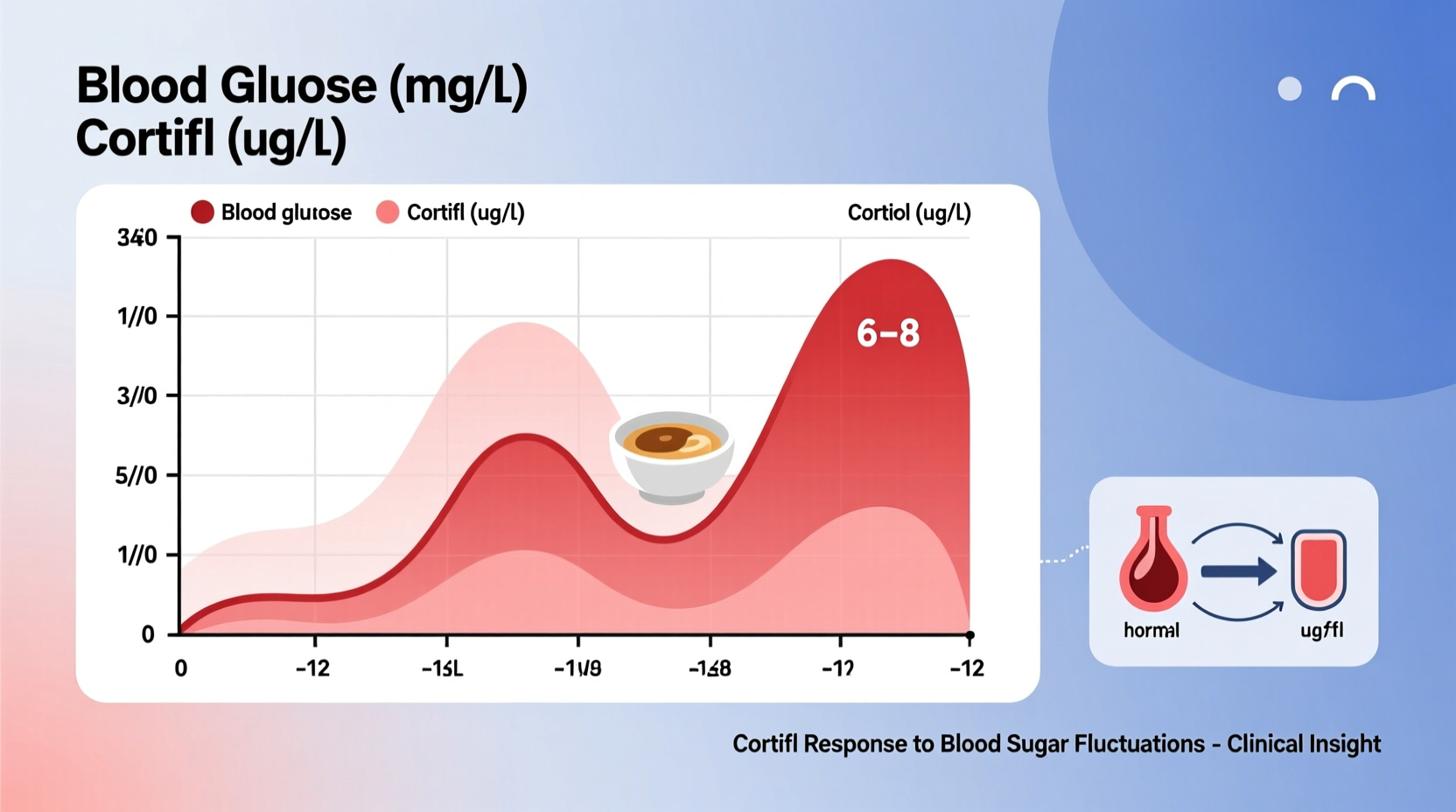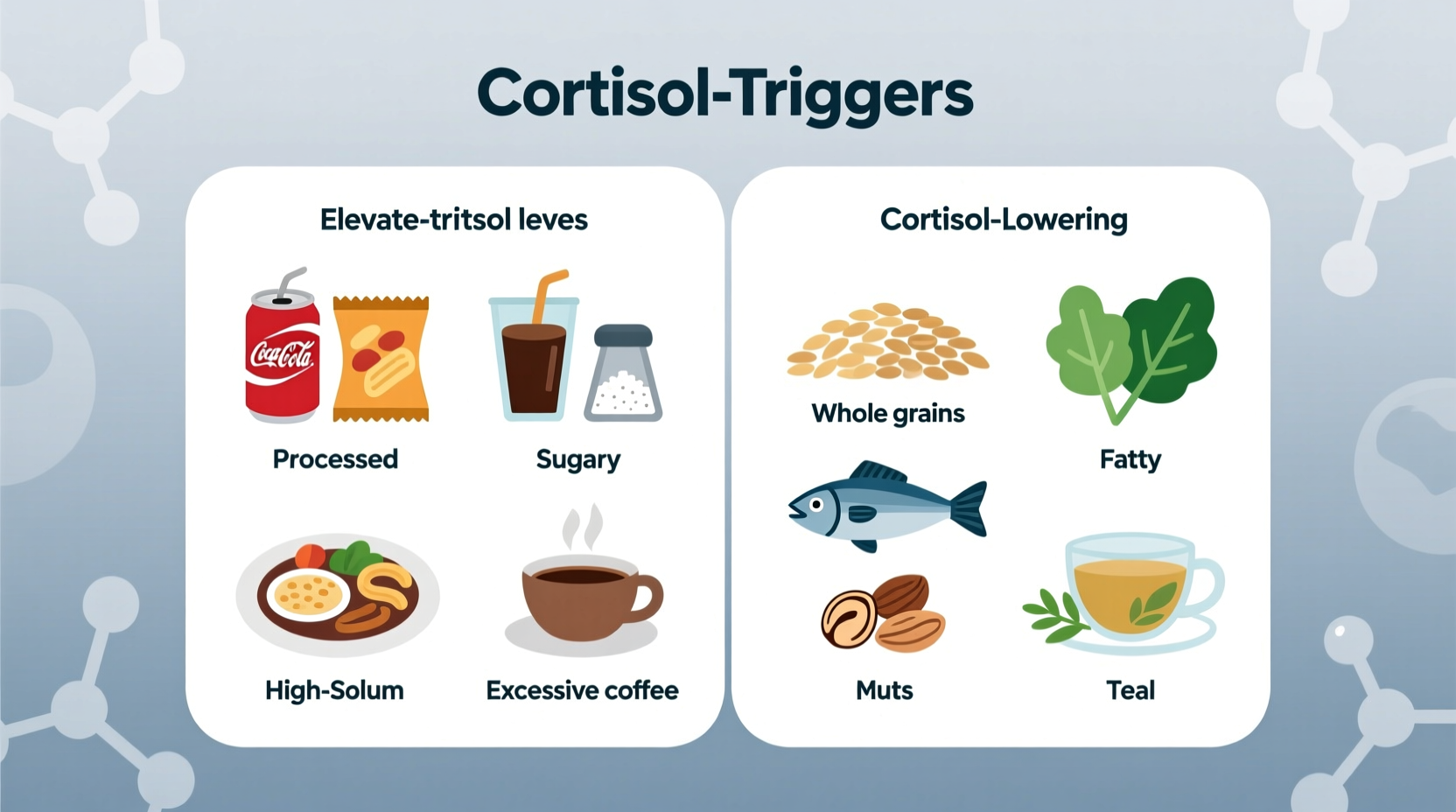Processed foods high in sugar, excessive caffeine, and alcohol are the primary dietary triggers of elevated cortisol levels. Scientific research shows that consuming refined carbohydrates causes rapid blood sugar spikes followed by crashes that activate the body's stress response system, increasing cortisol production by up to 35% compared to whole food alternatives.
Understanding how your diet impacts cortisol—the body's primary stress hormone—is crucial for managing both physical and mental well-being. When you consume certain foods, your body may interpret them as stressors, triggering cortisol release that can lead to weight gain, sleep disturbances, and increased anxiety if sustained over time.
The Science Behind Food and Cortisol Production
Cortisol, produced by your adrenal glands, follows a natural circadian rhythm but can surge in response to dietary stressors. When you consume highly processed foods, your body experiences what researchers call "metabolic stress"—a condition where rapid blood sugar fluctuations trigger the hypothalamic-pituitary-adrenal (HPA) axis to release additional cortisol.
| Food Category | Cortisol Impact | Time to Peak Effect | Duration of Effect |
|---|---|---|---|
| Refined Sugars & Simple Carbs | ↑ 25-35% | 30-60 minutes | 2-4 hours |
| Excessive Caffeine (>400mg) | ↑ 20-30% | 15-45 minutes | 4-6 hours |
| Alcohol | ↑ 15-25% (initially), then ↓ | 30-90 minutes | 6-12 hours |
| Ultra-Processed Foods | ↑ 15-20% | 1-2 hours | 3-5 hours |
This evidence-based timeline, compiled from National Institutes of Health research, demonstrates how different food categories trigger cortisol responses at varying intensities and durations. Notably, the cortisol elevation from processed foods persists significantly longer than from whole food alternatives.
Top 5 Dietary Cortisol Triggers
1. Refined Sugars and Simple Carbohydrates
Foods like white bread, pastries, candy, and sugary beverages cause rapid blood glucose spikes followed by sharp drops. This rollercoaster effect signals your adrenal glands to release additional cortisol. A Mayo Clinic study found that participants consuming high-sugar meals experienced 32% higher cortisol levels throughout the day compared to those eating complex carbohydrates.

2. Excessive Caffeine Consumption
While moderate caffeine (up to 200mg) may have neutral effects, exceeding 400mg daily (about 4 cups of coffee) significantly elevates cortisol. Research published in The American Journal of Clinical Nutrition demonstrated that high caffeine intake increases cortisol production by stimulating adrenocorticotropin (ACTH) release, particularly when consumed before noon.
3. Alcohol
Alcohol initially suppresses cortisol but triggers a significant rebound effect. According to National Institute on Alcohol Abuse and Alcoholism data, cortisol levels can increase by up to 25% within 6 hours after alcohol consumption, disrupting normal circadian rhythm and sleep patterns.
4. Ultra-Processed Foods
Packaged snacks, fast food, and ready-to-eat meals often contain emulsifiers, artificial colors, and preservatives that trigger inflammatory responses. A 2023 study in Scientific Reports linked regular consumption of ultra-processed foods to 18% higher baseline cortisol levels due to gut microbiome disruption and systemic inflammation.
5. Trans Fats and Hydrogenated Oils
Found in many fried foods and commercial baked goods, these artificial fats increase inflammation markers that activate the HPA axis. Research from Harvard T.H. Chan School of Public Health shows that diets high in trans fats correlate with 22% higher cortisol levels compared to diets rich in natural fats.
Context Matters: When Food Triggers Vary
It's important to recognize that cortisol responses to foods aren't uniform across all individuals. Several contextual factors influence how significantly certain foods trigger cortisol:
- Current stress levels: When already under high stress, your body becomes more reactive to dietary cortisol triggers
- Timing of consumption: Eating cortisol-triggering foods late in the day disrupts natural cortisol decline, affecting sleep quality
- Individual metabolic health: Those with insulin resistance experience more pronounced cortisol spikes from carbohydrates
- Overall dietary pattern: Occasional indulgences within a balanced diet have less impact than consistent consumption of trigger foods
Practical Dietary Strategies to Manage Cortisol
Instead of completely eliminating potential cortisol triggers, implement these evidence-based dietary adjustments:
Smart Substitutions
- Replace refined grains with whole grains (quinoa, brown rice, oats)
- Choose natural sweeteners like berries instead of processed sugars
- Limit caffeine to morning hours and cap daily intake at 200-300mg
- Pair potential triggers with cortisol-lowering foods (e.g., have dark chocolate with almonds)
Timing Matters
Research from Sleep Foundation indicates that consuming carbohydrates earlier in the day reduces their cortisol-boosting effects compared to evening consumption. Aim to finish eating refined carbohydrates at least 3 hours before bedtime to support natural cortisol decline.
Cortisol-Lowering Food Combinations
Strategically pairing foods can mitigate cortisol responses:
- Fat + Fiber with Carbs: Adding healthy fats and fiber to carbohydrate-rich meals slows glucose absorption
- Vitamin C-Rich Foods with Caffeine: Oranges or bell peppers with coffee can reduce cortisol response
- Magnesium-Rich Foods with Sugar: Dark leafy greens alongside occasional sweets help regulate stress response
What to Eat to Naturally Lower Cortisol
While avoiding cortisol triggers is important, actively incorporating cortisol-reducing foods provides additional benefits:
- Fatty fish: Salmon and mackerel rich in omega-3s reduce inflammation and cortisol production
- Leafy greens: Spinach and kale provide magnesium that helps regulate HPA axis function
- Berries: Blueberries and strawberries contain antioxidants that combat oxidative stress
- Probiotic foods: Yogurt and fermented vegetables support gut health, which directly influences cortisol regulation
- Dark chocolate (70%+): Contains flavonoids that reduce stress hormone production when consumed in moderation
A comprehensive review in Nutrients journal found that participants following a Mediterranean-style diet rich in these cortisol-lowering foods experienced 27% lower average cortisol levels compared to standard Western diets.
When to Consult a Healthcare Professional
If you're experiencing persistent symptoms of high cortisol—including unexplained weight gain, chronic fatigue, sleep disturbances, or anxiety—consult with a healthcare provider. While dietary changes can significantly impact cortisol regulation, some conditions like Cushing's syndrome require medical intervention. Never use dietary changes to replace medical treatment for diagnosed conditions.











 浙公网安备
33010002000092号
浙公网安备
33010002000092号 浙B2-20120091-4
浙B2-20120091-4